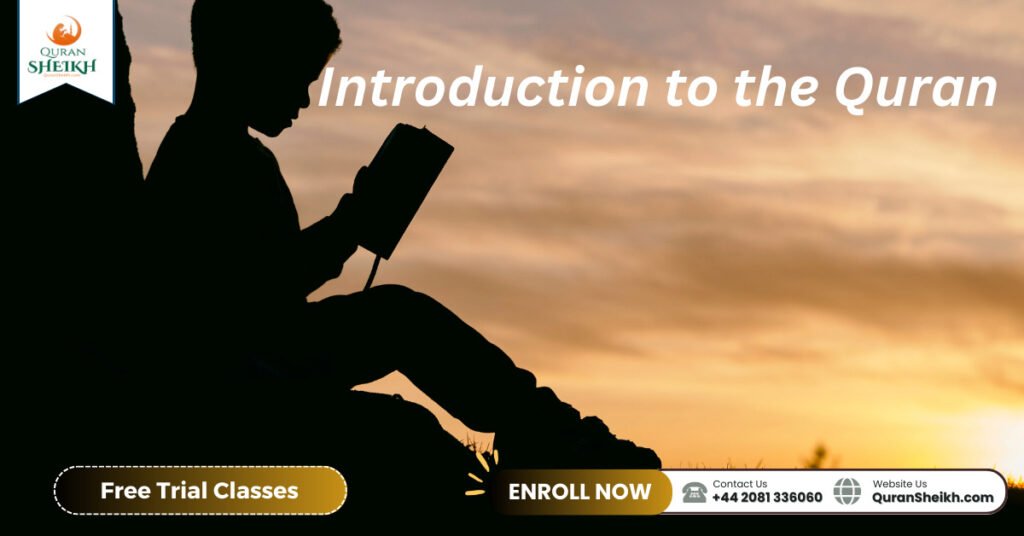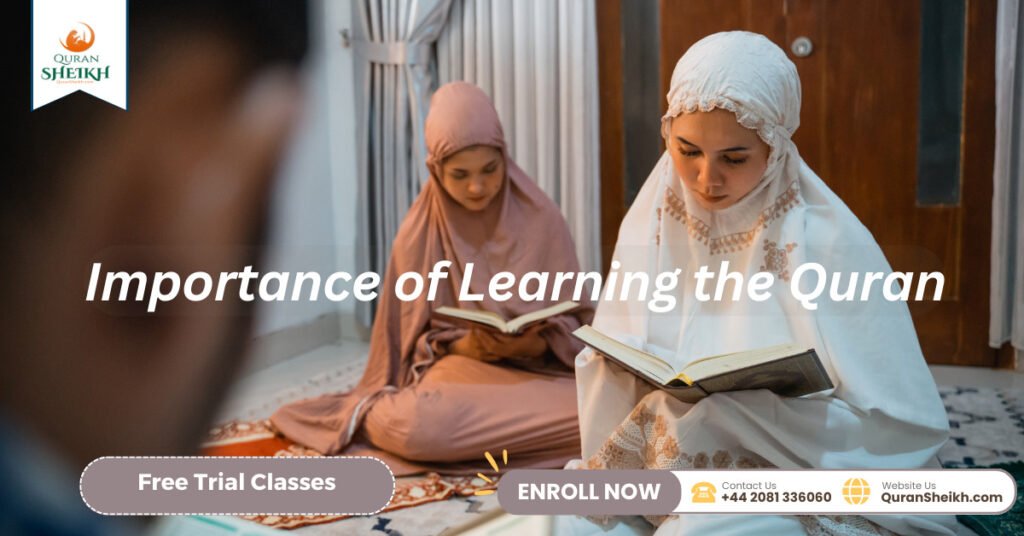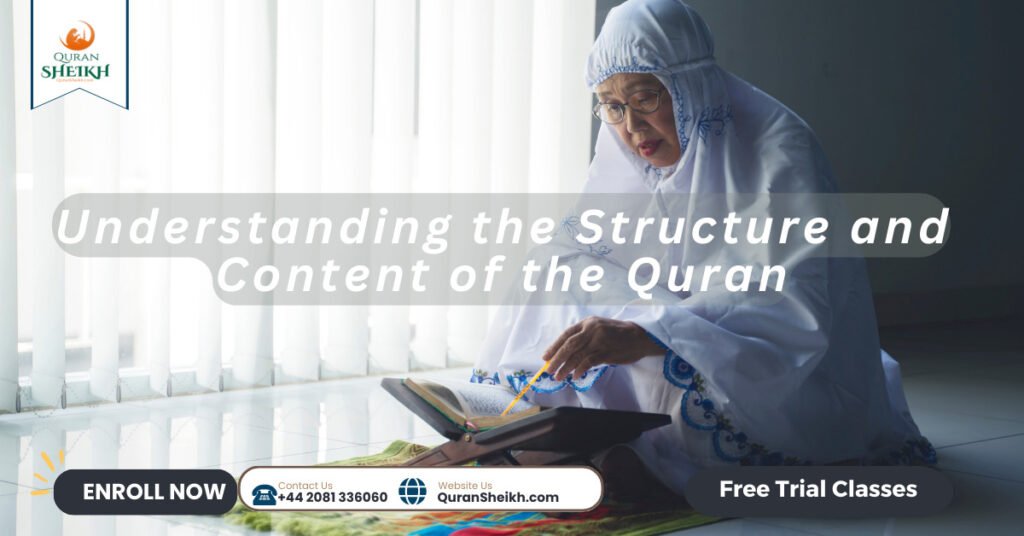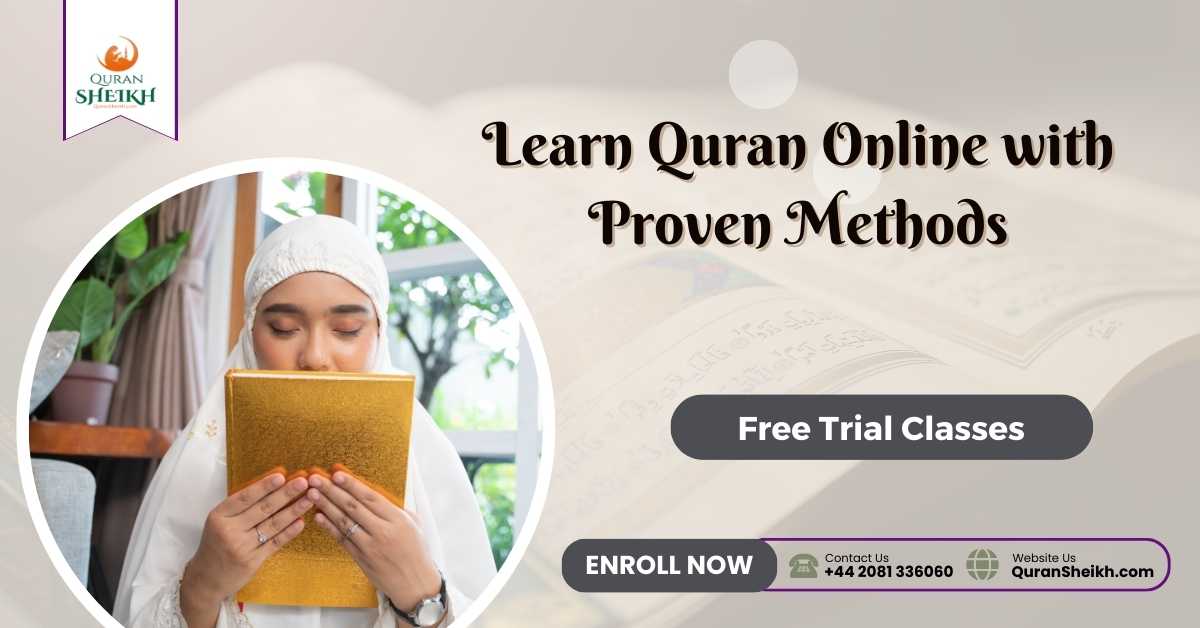Introduction to the Quran
Learn Quran: The Quran, considered the holy book of Islam, holds immense significance for Muslims worldwide. It is not merely a religious text but a comprehensive guide that addresses various aspects of life.
Learning the Quran helps people understand Islamic teachings, strengthen their faith, and gain valuable insights for personal growth.

This article aims to help readers understand the Quran and explore its wisdom. It offers advice for embarking on a transformative journey of learning. The goal is to provide a comprehensive understanding of the Quran.
This article is for those who are new to studying the Quran or want to improve. It contains important information, study tips, helpful resources, and effective advice. These will help you have a successful and satisfying experience with learning the Quran.
Join thousands of Muslim Families who love learning Quran, Arabic and Islamic Studies from the comfort of their Homes.
1. Introduction to the Quran
The Origin and Significance of the Quran
Islam regards the Quran, which is considered as the holy text, as Gods word that was revealed to Prophet Muhammad. For Muslims worldwide, it holds immense importance and is regarded as the ultimate reservoir of guidance and enlightenment.
The Quran serves as more than just a publication; it is a sacred communication that delivers solutions to existential inquiries and extends spiritual comfort and guidance.
The Structure and Organization of the Quranic Verses
Surahs, which are chapters in the Quran, are divided into verses called Ayahs. The Surahs vary in length, ranging from a few verses to several pages. The arrangement of Surahs is not random; instead, it follows a particular order established by the Prophet Muhammad under divine guidance. The structured organization helps readers navigate through the Quran and understand its teachings more effectively.
2. Importance of Learning the Quran

Spiritual and Personal Benefits
Learning the Quran has numerous spiritual and personal benefits. It helps individuals develop a strong connection with God, find inner peace, and deepen their faith. Reciting and understanding the Quranic verses brings comfort to the heart and mind, providing solace during challenging times. In addition, it fosters personal development and introspection, empowering individuals to pursue a virtuous and rewarding existence.
Understanding Islamic Principles and Values
Offering insights into Islamic principles, values, and ethics, the Quran serves as a valuable guidebook for Muslims. By studying the Quran, individuals can gain a deeper understanding of the beliefs and practices that shape their religion. Family, relationships, social justice, and morality are among the aspects of life that it offers guidance on. Learning the Quran equips individuals with the knowledge to navigate religious and ethical dilemmas and make informed choices.
Quran Memorization Course Online with an Arab teacher with 30% Off
3. Understanding the Structure and Content of the Quran

The Chapters (Surahs) and Verses (Ayahs) of the Quran
The Quran consists of 114 Surahs, each with a unique name and distinct message. Some Surahs focus on historical events, while others emphasize moral teachings, social issues, or spiritual guidance. Each Surah is composed of multiple Ayahs, which are interconnected and contribute to the overall theme and message of the chapter.
Themes and Topics Covered in the Quran
Both personal and societal life are encompassed by the various themes and topics found in the Quran. Discussing monotheism, a higher power, life’s purpose, human nature, morals, spirituality, equality, and more. The Quran offers practical guidance on various matters, promoting values such as compassion, justice, honesty, humility, and patience.
The goal of its teachings is to create a fair and balanced society, promoting peace and understanding among people.
4. Learning Quranic Arabic and Pronunciation
Basics of Arabic Grammar and Vocabulary
Mastering the fundamentals of Arabic grammar and vocabulary is imperative for grasping the essence of the Quran. The Quran was revealed in Arabic, and by learning this language, individuals can explore the intricate details and profound essence of the original text despite the availability of translations in various languages. This includes understanding verb conjugation, noun declension, sentence structure, and common vocabulary used in the Quran.
Correct Pronunciation and Tajweed Rules
Pronunciation is crucial when reciting the Quran. Learning the correct pronunciation of Arabic letters and applying Tajweed rules ensures that the words are recited with proper phonetics and intonation. Tajweed rules help preserve the beauty and rhythm of the Quran and enhance the recitation experience. By adhering to Tajweed, individuals can recite the Quran more accurately and appreciate its melodious nature.
5. Study Methods and Resources for Learning the Quran
Choosing a Quran Learning Methodology
There exists a variety of approaches when it comes to acquiring knowledge about the Quran. Some people prefer traditional classroom settings with a teacher, while others opt for online courses or self-study. It’s important to consider your learning style and preferences when selecting a methodology.
If you excel in a well-organized atmosphere, a traditional classroom setup could be the perfect fit for you. Alternatively, if you favor a customizable timetable and independent learning, digital resources or study materials for self-study could be more appropriate.
Recommended Books, Websites, and Apps
Luckily, a wide range of resources are accessible to assist in the acquisition of Quranic knowledge. There is something for everyone, whether they prefer physical books or digital platforms. Some popular books include “The Noble Quran” translated by Dr. Muhammad Taqi-ud-Din al-Hilali and Dr. Muhammad Muhsin Khan, as well as “The Study Quran” edited by Seyyed Hossein Nasr.
If you prefer online learning, websites like Quran.com and Bayyinah.com offer comprehensive Quranic resources. Additionally, there are mobile apps such as Quran Companion and Quran Majeed that provide easy access to the Quran on-the-go.
6. Memorization Techniques and Tips
Effective Memorization Strategies
When it comes to memorizing the Quran, one might face a challenging endeavor, nonetheless, employing appropriate methods can make it less overwhelming.
One effective strategy is to break the Quran into smaller portions or surahs and focus on memorizing one at a time. Repetition is key, so practice reciting each portion regularly until it’s committed to memory.
It’s also helpful to recite the verses out loud, as the auditory input enhances memorization. Finally, finding a study partner or joining a Quran memorization group can provide support and accountability, making the process more enjoyable.
Utilizing Memorization Tools and Techniques
In addition to traditional methods, there are various tools and techniques that can aid in Quran memorization. Using mnemonic devices, such as creating associations or visualizations, can help in remembering verses.
Writing out verses repeatedly can also reinforce memorization. Technology can be advantageous too, with apps like Quran Memorizer and Memorize Quran providing features like repetition reminders and interactive quizzes to test your recall. Discover your optimal approach by trying out various tools and techniques.
7. Applying the Teachings of the Quran in Daily Life
Understanding and Implementing Quranic Principles
Gaining knowledge of the Quran surpasses simply memorizing verses as it entails comprehending and incorporating its teachings into our everyday existence. Take the time to study the meanings of the verses and reflect upon their practical application. Whether it’s kindness, patience, or humility, the Quran offers timeless guidance for leading a righteous life. Make sure to always remember these principles and work on integrating them into your actions and interactions with others.
Practical Examples and Applications
To better comprehend how to apply the teachings of the Quran, seek out practical examples and real-life scenarios. Books like “Way to the Quran” by Khurram Murad provide valuable insights into the day-to-day relevance of Quranic teachings. You can also engage in discussions with knowledgeable scholars or participate in study groups to gain deeper insights and practical advice. By actively seeking out practical applications, you will enhance your understanding of the Quran and its impact on your daily life.
8. Overcoming Challenges in Learning the Quran
Motivation and Persistence in Quran Learning
Learning the Quran is a journey that requires motivation and persistence. Navigating through the journey, it is typical to face various highs and lows; nevertheless, by nurturing an unwavering determination and consistently reminding oneself of the ultimate benefits, one can retain their motivation. Set realistic goals and celebrate the milestones you achieve.
Surround yourself with a supportive community that shares your passion for learning the Quran. With dedication and perseverance, you can overcome any challenges and continue progressing on your Quranic journey.
Dealing with Language Barriers and Time Constraints
Language barriers and time constraints are common challenges when learning the Quran. If Arabic is not your native language, consider seeking assistance from qualified teachers or utilizing translation resources to better comprehend the meanings of the verses.
As for time constraints, finding small pockets of time throughout the day, such as during commutes or before bed, can add up to significant study time. Remember, every minute counts, and consistent effort, no matter how small, will yield results over time. In conclusion, learning the Quran is a lifelong journey that brings immense rewards and blessings to those who embark upon it.
By understanding its structure, content, and teachings, individuals can cultivate a deeper connection with their faith and apply the wisdom of the Quran in their daily lives. While the path may have its challenges, with dedication, perseverance, and the right resources, anyone can attain proficiency in the Quran.
So, let us embrace the opportunity to explore the divine guidance present within the pages of the Quran and strive to live a life that reflects its noble principles and values.
May our collective efforts in learning and practicing the Quran bring about personal growth, spiritual enlightenment, and a positive impact on the world around us.
What is the best way to learn to read the Quran?
The best way to learn to read the Quran is to find a qualified Quran teacher who can guide you through the basics of Arabic pronunciation and tajweed (Quranic recitation rules). Once you have a solid foundation in the basics, you can start practicing on your own, listening to Quran recitations, and reciting along. It is also important to be patient and persistent, as learning to read the Quran takes time and effort.
Here are some additional tips for learning to read the Quran:
- Start with the basics. Learn the Arabic alphabet, vowels, and consonants.
- Learn tajweed rules. Tajweed is the science of reciting the Quran correctly.
- Find a qualified Quran teacher. A good Quran teacher can help you learn the basics and correct your mistakes.
- Practice regularly. The more you practice, the better you will become at reading the Quran.
- Be patient and persistent. Learning to read the Quran takes time and effort.
Remember, the Quran is a gift from Allah SWT, and learning to read it is a blessed act. With patience and perseverance, you will be able to reap the many rewards of reading the Quran.
What is the fastest way to learn Quran?
The fastest way to learn Quran is to find a qualified teacher who can guide you through the process. With a good teacher, you can learn the basics of Quran reading and recitation, as well as tajweed (proper pronunciation) in a short period of time.
Once you have a solid foundation in Quran reading, you can begin to memorize the verses. There are many different memorization techniques that you can use, but the most important thing is to be consistent with your practice. Aim to memorize a few verses each day, and review them regularly to ensure that you retain them.
In addition to memorization, it is also important to understand the meaning of the Quranic verses. This will help you to appreciate the beauty of the Quran and to apply its teachings to your life.
Here are some additional tips for learning Quran quickly:
- Be motivated and dedicated. Learning Quran takes time and effort, but it is a rewarding journey.
- Set realistic goals. Don’t expect to memorize the entire Quran overnight. Start with small goals, such as memorizing a few verses each day.
- Find a learning method that works for you. There are many different ways to learn Quran. Experiment with different methods until you find one that you enjoy and that helps you to learn effectively.
How can I memorize Quran without forgetting?
Start by memorizing small amounts of text each day, and gradually increase your goal as you become more proficient. It is also important to review what you have memorized regularly to prevent it from slipping away.
One way to make the Quran a part of your daily life is to recite it regularly, whether it is during your prayers, in your free time, or while you are doing chores. You can also listen to Quran recitations, which can help to reinforce the verses in your mind.
Here are some additional tips that may help you to memorize the Quran without forgetting:
- Understand the meaning of the verses you are memorizing. This will help you to connect with the text on a deeper level and make it easier to remember.
- Use mnemonic devices, such as rhymes or acronyms, to help you remember specific verses or phrases.
- Recite the verses out loud, as this will help to engage your auditory memory.
- Find a study partner or join a Quran memorization program to stay motivated and accountable.
Best Quran memorization program with qualified Arab tutors and get 30% OFF, Quran classes for Kids
What are some common inquiries people have (FAQ)?
1. Do I need to have knowledge of Arabic to learn the Quran?
No prior knowledge of Arabic is required to begin learning the Quran. While understanding Arabic can certainly enhance your comprehension, there are various resources available that provide translations and transliterations to help non-Arabic speakers engage with the Quranic text.
2. What is the time frame required to memorize the Quran in its entirety?
From individual to individual, the duration required to commit the whole Quran to memory differs. Factors such as dedication, consistency, and individual learning ability play a significant role.
While certain individuals may require multiple years to commit the entirety of the Quran to memory, some others might achieve this feat within a more expedited period of time. The key is to maintain a regular practice routine and seek guidance from experienced tutors or scholars.
3. Are there any recommended study methods for learning the Quran?
Yes, there are several study methods that can aid in learning the Quran effectively. Some common methods include attending Quranic classes or courses, studying with a qualified teacher or scholar, utilizing online resources, and engaging in group study sessions. It is important to find a method that suits your learning style and enables consistent progress.
4.How can I infuse the teachings of the Quran into my daily activities?
Applying the teachings of the Quran in daily life requires a conscious effort and a genuine desire for personal growth. Start by understanding the principles and values emphasized in the Quran, such as compassion, justice, and integrity.
Reflect on how these teachings can be incorporated into your interactions, decision-making processes, and overall conduct. Additionally, seeking knowledge and guidance from knowledgeable individuals or scholars can further enhance your understanding and application of Quranic teachings.


